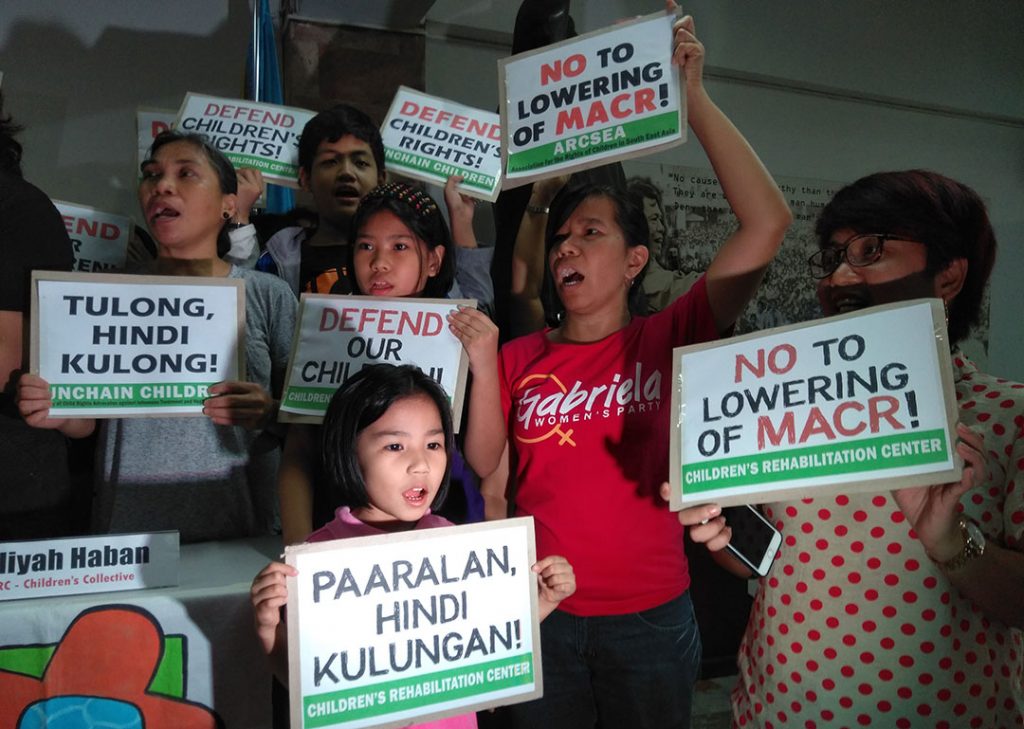“The developmental maturity of juveniles mitigates their criminal culpability.”- Psychological Association of the Philippines
By RONALYN V. OLEA
Bulatlat.com
MANILA — As legislators are expected to vote on the bill seeking to lower the minimum age of criminal responsibility from 15 to 12, children added their voices against the proposal.
Aaliyah Haban, 13, said children in conflict with the law (CICL) are victims of poverty and should not be punished.
“These children need help and support from the government, not detention or punishment, ” Haban, spokesperson of Children Rehabilitation Center Children’s Collective (CRC) said in Filipino during a press conference this morning, Jan. 26 at the Commission on Human Rights.
Seventeen-year-old Jansen Bordaliza agreed with Haban, saying that children whose parents do not have decent jobs, are forced to commit crimes. “It’s very clear that the proposal targets poor children,” he said in Filipino.
According to 2016 data from the Department of Social Welfare and Development (DSWD), 65 percent of CICL came from poor families without stable source income.
Children’s rights advocate Madella Santiago likened the bill to tokhang (anti-drug operations) as it would victimize the poor.
Hear the children. #ChildrenNotCriminals pic.twitter.com/hQVUQ47G7g
— Bulatlat (@bulatlat) January 26, 2019
Punitive, not restorative
The bill is described as punitive by Gabriela Women’s Party Rep. Arlene Brosas. “The government would be creating criminals out of our children,” Brosas told Bulatlat in an interview.
She explained that if the bill is enacted, more children would be sent to regular detention facilities as there are limited Bahay Pag-asa centers in the country.
There are only 58 Bahay Pag-asa all over the country and only two are being run by the DSWD. Not all highly-urbanized centers have facilities for young law offenders as mandated by the Juvenile Justice and Welfare Act of 2006 (JJWA).
Brosas told Bulatlat she witnessed how children were detained along with adults. She recalled that more than 20 children were arrested during the demolition of urban poor homes in the East Bank of the Manggahan Floodway, Sta. Lucia village in Pasig City in October 2017.
The same thing happened during the demolition of homes in Navotas, Brosas said.
“The children were detained with their parents,” Brosas said.
Those in Bahay Pag-asa centers are no better. “There’s no hope for children in Bahay Pag-asa,” she said, citing the absence of efficient and effective rehabilitation program for CICL.
“The structures are there but there is no genuine program,” Brosas said. “There are no psychologists, doctors, nurses and there are a limited number of social workers.”
Brosas’s observation is the same with the statement of the Juvenile Justice and Welfare Council (JJWC) Executive Director Tricia Oco. In a report, Oco said Bahay Pag-asa for CICL “are worse than jail cells, lacking even furniture.”
No funds were allocated for the construction of more Bahay Pag-asa centers in the 2019 national budget, according to a report.
Brosas lamented that the House of Representatives has not acted on the resolutions filed by GWP as early as 2016. House Resolution 235 urges the House Committee to investigate the dismal, unsanitary and neglected conditions of Bahay Pag-asa and the alleged inhumane treatment of CICL inside the said facilities. House Resolution 252, meanwhile, urges the Committee on Appropriations to conduct an inquiry on the insufficient funding for the construction, management and operation of Bahay Pag-asa facilities.
Santiago, executive director of the Association for the Rights of Children in South East Asia (Arcsea), pointed out that the bill has no basis in science, saying that research shows that the age of discernment is 15 years old.
The Psychological Association of the Philippines (PAP), in its position paper opposing the bill, said,
Although they may be able to discern right from wrong action, it is their capability to act in ways consistent with that knowledge that is compromised by several factors…”
PAP identified these factors: deficiencies in decision-making capacity; heightened vulnerability due to coercive circumstances; and, the disadvantaged environment and profile of Filipino CICL.
Like Brosas, PAP fears that CICL’s “exposure to the criminal justice system, where the child will be labeled a criminal and where he or she is exposed to criminal models, will more likely establish the ‘criminal identity’ of the young person.”
PAP said studies have shown that encounters with the adult justice system results in greater subsequent crime, including violent crime, for the juvenile.
Solutions
Advocates agree that lowering the minimum age of criminal responsibility is not the solution.
Santiago said the government should address poverty if it wants to lessen the number of CICL.
Fourteen-year-old Carhrihl Aguilar said the government must provide free education to poor children and job security to their parents.
Santiago added that the rehabilitation program for CICL must be age-appropriate, gender sensitive and culturally sensitive. “All of these are absent in the implementation of the Juvenile Justice and Welfare Act,” she said.
Salinlahi Alliance for Children’s Concerns said efforts should be poured toward ensuring adequate and proper implementation of JJWA. These include increasing the budget of the primary agencies implementing the JJWA, establishing more Bahay Pag-asa and supporting initiatives that provide for the rehabilitation and reintegration of CICL.
Frances Bondoc, executive director of CRC, called on the public to intensify the pressure on legislators to vote against the bill.
The post Children, advocates say lowering minimum age of criminal responsibility punitive, anti-poor appeared first on Bulatlat.

